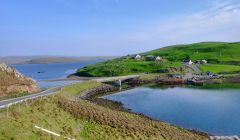Council / Councillors seek to explore options for achieving ‘financial and political self-determination’
Nine elected members say the ‘prosperity, and even basic sustainability’ of Shetland is being threatened from centralisation and reduced public funding
NINE councillors – including Shetland Islands Council’s leader and convener – are proposing a motion which would see the local authority formally explore options for achieving “financial and political self-determination”.
The motion is set to be presented to a meeting of the full council on 9 September.
Councillors Duncan Anderson, Andrea Manson and Alec Priest have been a driving force behind plans for a motion on greater autonomy.
But they now have support of the top brass in the council chamber, from leader Steven Coutts and convener Malcolm Bell to its main committee chairs.
Coutts said: “We are at crossroads – we can sit back and continue to see our ability to deliver community outcomes diminished, or we can do something about it”.
He added that the motion is the “first step” in the process of exploring how to achieve more powers.
The leader also said that recent initiatives such as the Islands Act have failed to bear fruit.
With the SIC having 22 elected members, the motion – which says more decision making is being centralised and public funding is being “consistently reduced” – is well on its way to achieving majority backing.
It comes at a time when there is growing frustration over the hand dealt to Shetland Islands Council in the Scottish Government’s core funding settlements.
The motion reads: “We believe that Shetland has the wherewithal to have a positive future. However, in recent times we have seen more and more decision making being centralised and public funding being consistently reduced.
“We are concerned that this ongoing situation is seriously threatening the prosperity, and even basic sustainability, of Shetland as a community.
“In order to look at alternatives to ensure Shetland can reach and maintain its full potential, we, the undersigned, move that:
Become a member of Shetland News
“The Shetland Islands Council formally begins exploring options for achieving financial and political self-determination.”
It has been signed by Steven Coutts, Duncan Anderson, Alastair Cooper, Andrea Manson, Malcolm Bell, George Smith, Ryan Thomson, Alec Priest and Emma Macdonald.
Commenting on the notice of motion, Coutts said that “measures that should have helped [Shetland] have not.
“The Scottish Parliament approved the Islands Act in 2018, yet it has made no meaningful difference,” he said.
“We have some major economic opportunities in Shetland but also a significant inequality among our community to overcome.
“The recovery and renewal from Covid-19 will bring this into sharp focus and will be extremely challenging.
“We need all the political and financial levers we can muster, and it is right we begin work to explore how we achieve them. This motion is the first step in that process.”
North Mainland member Manson and the North Isles’ Anderson and Priest all stood as independent candidates during the last council election in 2017, but they voiced their support for autonomy during their campaigns.
Speaking about the motion, Anderson said: “It is no secret that some members of this council have been advocates of greater self-determination for Shetland for a long time.
“Indeed, three of us had it specified in our manifestos back in 2017.
“Our positions are clear but now we are delighted to see that many other councillors are now viewing this concept as a desirable, or even essential, route to ensuring the long-term sustainability and prosperity of the community of Shetland.
“It is clear to us that, in order to maximise Shetland’s potential, decision making must be more localised, and Shetland needs to be able to directly benefit from a fairer share of the vast revenues that flow out of these islands.
“To that end, work has been ongoing internally and we are pleased to be part of the notice of motion being presented to the full council on the 9th of September.
“If passed, this will be the first formal step for this council to explore the options around self-determination. It is early stages, but we are hopeful this could lead to an outcome where the powers and resources exist locally to address the many challenges we currently face.”
It is unclear what exact options will be investigated but the self-governing Faroe Islands, which are part of Denmark, has previously been cited by some as a blueprint of how Shetland could be run in the future.
Faroe – with a population of nearly 50,000 – has control over areas like energy, environment, taxation, trade and education, as well as the management of fisheries and “all other utilisation of natural resources”.
One argument which has been raised for Shetland autonomy has been oil revenue, as well as fishing.
The Faroe Islands have their own democratically elected assembly, and a government headed by a prime minister, while they also have two representatives in the Danish parliament.
The Danish Government grants an annual subsidy to the Faroe Islands. The grant, which sits at around 642 million DKK (86 million Euro), funded 13 per cent of the national budget in 2017.
While Denmark is part of the European Union, Faroe is not.
Also in the mix regarding Shetland autonomy is the political backdrop of a possible second Scottish independence referendum.
Shetland News recently sought councillors’ views on more autonomy for the isles – with a largely positive response coming back.
However, some were unsure exactly how it could be achieved – while Lerwick South member Amanda Hawick believed the council needed to get its own finances in order first before exploring autonomy.
Become a member of Shetland News
Shetland News is asking its readers to consider paying for membership to get additional perks:
- Removal of third-party ads;
- Bookmark posts to read later;
- Exclusive curated weekly newsletter;
- Hide membership messages;
- Comments open for discussion.
If you appreciate what we do and feel strongly about impartial local journalism, then please become a member of Shetland News by either making a single payment, or setting up a monthly, quarterly or yearly subscription.













































































